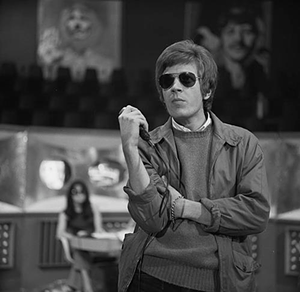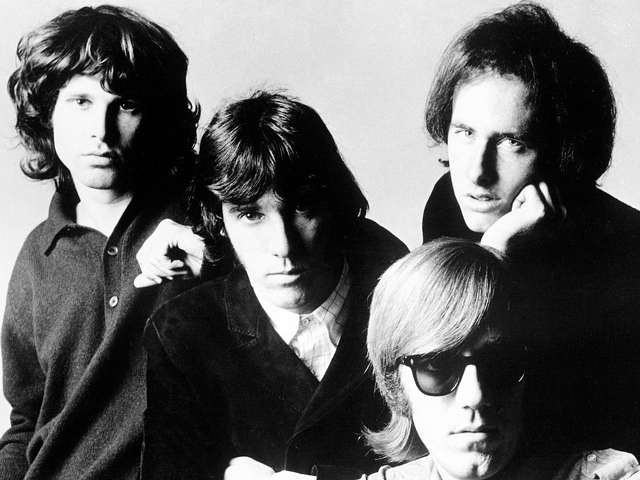Scott Walker's path from Ohio to European pop stardom to a perch as a revered avant-garde composer must have been long, strange and fascinating. It ended Friday when Walker, born Noel Scott Engel in Hamilton, Ohio in 1943, died at 76 years old.
Along the way, Walker parlayed fame from his time in the Walker Brothers, a slick 1960s trio that performed songs by Burt Bacharach and other Pop composers, into something far more unique and influential via a number of increasingly-experimental solo albums that pushed the boundaries of music and plumbed some of the darkest corners of the 20th and 21st centuries.
After moving around with his father, a geologist employed by the oil industry, Walker and his mother ended up in California by the end of the 1950s. Here, he picked up his love for performance, starting as a young actor and teen idol-style singer before getting session gigs on bass guitar in Los Angeles for various groups kicking around the Golden State.
While playing for one of those groups he met John Maus. The two formed The Walker Brothers with drummer Gary Leeds and Scott took the project's surname as his own. Walker would use it almost exclusively, at least for his musical projects, for the rest of his life.
Originally, Maus was the band's lead singer, but Walker's rich, distinctive baritone soon pushed him to the front of the group. After relocating to London in 1965, The Walker Brothers scored a series of hits that made them huge in Europe and also drew acclaim in the U.S., including "Love Her," "Make it Easy on Yourself" and "The Sun Ain't Gonna Shine No More."
But Walker, whose interests ranged from Jazz to art cinema, was increasingly frustrated by what he felt were the artistic constraints the group placed on him. He left The Walker Brothers in 1967 to strike out on his own, releasing a series of solo records that blended songs from some of Europe's biggest composers with his own somewhat darker songs. Those albums found big audiences, and by 1969, Walker had his own show on BBC TV.
That year proved to be a turning point for Walker, whose fifth solo album did not achieve the same success as his past efforts. Some of that may have been due to the fact that Walker used his given name — not his stage name — for the work. But the album's commercial failure and Walker's increasing aversion to fame sent him into a long period of self-described artistic decline. The Walker Brothers reunited briefly in the 1970s for touring and a series of albums. The final of those, Nite Flights, featured four dark original works by Walker. It didn't chart or sell well, The Walker Brothers broke up again and Walker disappeared almost entirely from music for a time.
Walker attempted a second act in the 1980s with the release of a highly experimental and critically-lauded solo album called Climate of Hunter before falling back into a period of inactivity. By the 1990s, however, a reawakening of appreciation for his work, including a cover of Walker's song "Nite Flights" by David Bowie, inspired the Ohio native to begin working again on new albums like 1995's Tilt. That album, also critically acclaimed, combined hints of Rock music with increasingly stark contemporary classical and avant-garde elements and dark themes that included war and murder.
Eventually, Walker signed to the iconic UK label 4AD, which released his work for 15 years until he passed away.
"For half a century, the genius of the man born Noel Scott Engel has enriched the lives of thousands, first as one-third of The Walker Brothers, and later as a solo artist, producer and composer of uncompromising originality," 4AD wrote today in a statement announcing Walker's death. "Walker has been a unique and challenging titan at the forefront of British music: audacious and questioning, he has produced works that dare to explore human vulnerability and the godless darkness encircling it."
Walker's work wasn't always commercially successful, but it had an enormous impact on the musical landscape around him. Bowie counted him as among his biggest influences, as did Radiohead. The latter's arty explorations of alienation intertwined with Pop music and experimental soundscapes would not have been possible without Walker's pioneering work, and snippets of his songs can be heard in Meeting People is Easy, the 1998 documentary about the band. A documentary about Walker himself, Scott Walker: 30 Century Man, came in 2006.
Radiohead's Thom Yorke called Walker "a kind gentle outsider" in a tweet following the announcement of his death.
"So very sad to hear that Scott Walker has passed away," Yorke wrote. "He was a huge influence on Radiohead and myself, showing me how i could use my voice and words."
So very sad to hear that Scott Walker has passed away, he was a huge influence on Radiohead and myself, showing me how i could use my voice and words. Met him once at Meltdown, such a kind gentle outsider. He will be very missed. https://t.co/v33Ey91hbn
— Thom Yorke (@thomyorke) March 25, 2019
Walker didn't talk much about his Ohio roots. But he did seem to make at least one rather beautiful nod to them. The song "Lights of Cincinnati," written for him by English songwriters Tony Macaulay and Geoff Stephens, was Walker's third solo single in 1969. It reached No. 13 on the UK Singles Chart that year.






